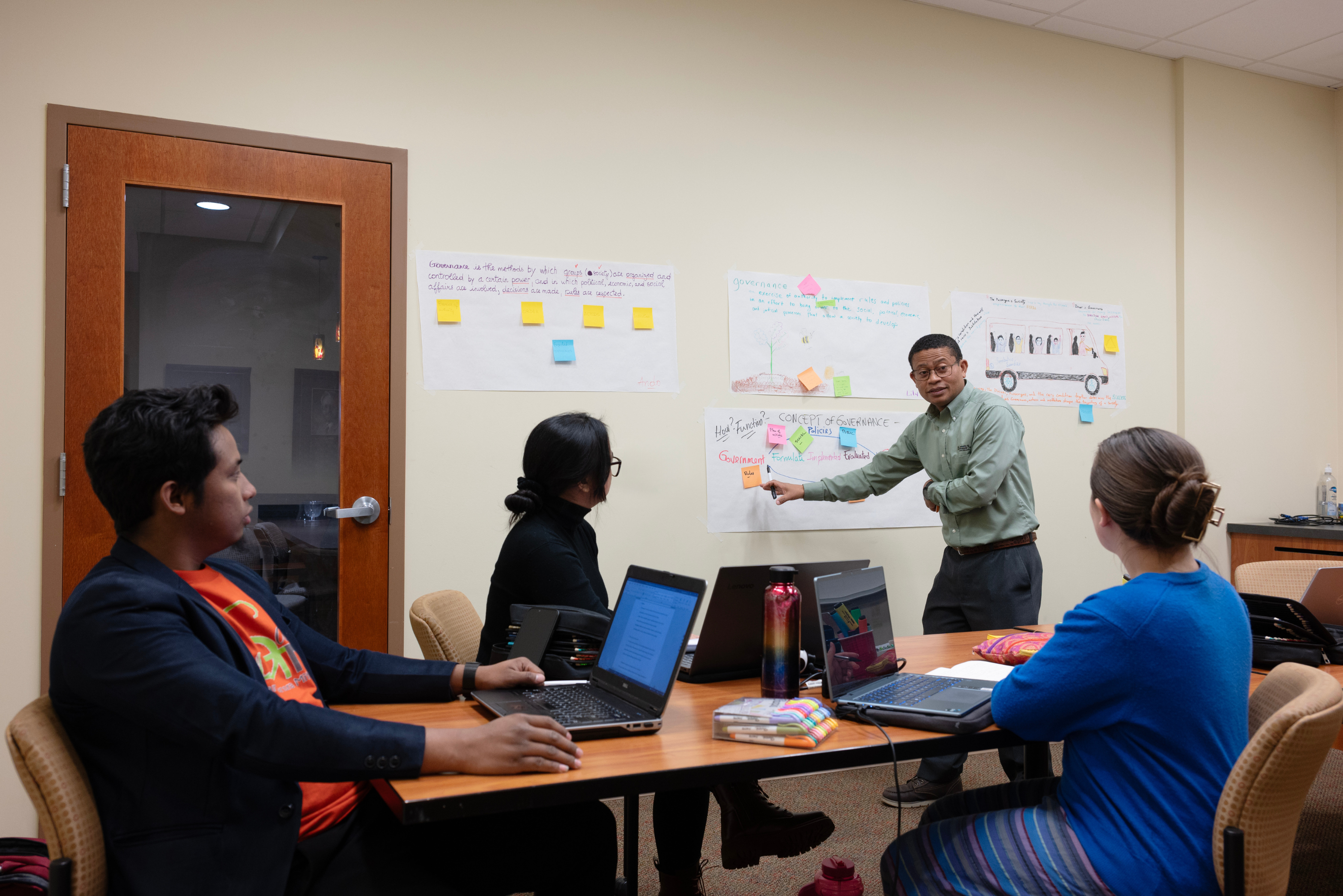
Community & International Development Program Overview
ACADEMIC STANDARDS ADMISSION REQUIREMENTS APPLICATION DEADLINES CONTACT US CURRICULUM CONCENTRATIONS DUAL DEGREES FINANCES GRADUATE STUDIES HUMANITARIAN & DEVELOPMENT INTERNATIONAL STUDENTS ONLINE OPTIONS PROGRAM LENGTH SCHOLARSHIPS WHY MSCID
HUMANITARIAN AND DEVELOPMENT
Our Foundation courses cover the overarching theories, principles, and tools to ensure sustainable humanitarian operations and development actions. The focus is to help students gain the necessary knowledge and skills in the Humanitarian and Development fields. Humanitarian skills include preventing loss of life, alleviating pain and suffering, and protecting human dignity before, during, and after a disaster. Development skills facilitate changes that will improve people’s capabilities and choices, enhancing their quality of life.
Our Elective courses allow students to create a personalized package by choosing their specific areas or sectors of interest within the humanitarian and development continuum. They will gain competencies that will enable them to address disasters, emergencies, poverty, and other long-term issues that affect the local, regional, and international communities.
CURRICULUM
The Community and International Development program offers interdisciplinary study in the humanitarian and development field at the graduate level. Students will explore the social science foundations, especially in regard to probing the meaning of people-centered development and principled and ethical humanitarian actions. They will develop skills related to program planning, implementation, and evaluation and will gain knowledge in principles of organizational behavior, leadership and management as they relate to non-profit organizations. Further, ethical principles and financial analysis for assuring individual and organizational accountability will be covered. Social research methods and techniques of communicating with stakeholders about their community development plans will be mastered. This unique approach equips students with the skills needed to identify and respond to social and economic challenges across the globe. Program concentration options offer in-depth training - preparing students for professional service in academia, policy, advocacy, project management, and administration.
In order to receive a Master in Community and International Development (MSCID), students will complete 30 credits of required coursework in the following areas: Foundation and Program Elective courses.
All students in our program are required to take an internship of at least 720 hours, complete a research project and take a portfolio development seminar. Total Credits: 30.
Students with previous completed or current enrollment in a masters may need to complete 24 credits. Up to 6 credits (20% of credits) may be transferred from a previous graduate degree. See Bulletin or advisors for more details about your case.
This degree is offered in both an on-campus, online, and a blended format.
To view the courses required please visit the official AU Bulletin Page for the MSCID Program by clicking this link:
DUAL DEGREES
Dual enrollment is available to graduate students who want to get undergraduate credits toward an additional undergraduate degree while working at the same time on a graduate degree. This status is also available to graduate students who want to pursue two graduate degrees at the same time. For more information about dual degrees, we recommend you check out the MSCID Bulletin and/or speak with your advisor.
MSCID dual degree options:
|
MSCID / MDiv Community & International Development / Divinity |
MSCID / MSW Community & International Development / Social Work |
|---|---|
| Bulletin | Bulletin |
| Download degree plan | Download degree plan |
ONLINE OPTIONS
Most of our courses are offered remotely with both synchronous or asynchronous options for online students. You can attend classes remotely via Zoom while they are taught, or you can watch recordings of class sessions at your convenience during the week. Coursework, projects and deadlines are still required and are the same as for those attending classes in-person on campus. Take a look at the Course Schedule to find the course offerings each semester. Online/remote synchronous/field-based courses end with a 900 number (course number example: CIDS 663 999). In the Course (CRN) / Campus / Sched. Type / Instr. Method column it will indicate the learning options our courses (CIDS) for the selected semester are available in.
PROGRAM LENGTH
Full-time students typically complete the program in two years. The time spent on completing the intership and research project requirements determine the length of studies.
Time Limits on Graduate Degrees
ACADEMIC STANDARDS AND POLICIES
- Candidates for MSCID degree are subject to the following standards of scholarship:
-
In harmony with its mission statement, Andrews University expects students to demonstrate the ability to think clearly and exhibit personal moral integrity in every sphere of life. Honesty in all academic matters is a vital component of personal integrity, which explains why breaches in academic integrity principles are taken seriously by the University.
- Student Responsibilities
- Academic Integrity - Bulletin
- Academic Integrity - Student Handbook
ADMISSION REQUIREMENTS
All applicants must meet the following criteria, in addition to general admission requirements of the Andrews University School of Graduate Studies & Research:
- A Bachelor’s Degree from an accredited college or university.
- An overall undergraduate GPA of 3.0 in 8 or more credits of previously taken graduate courses graded A-F. Students may be admitted provisionally with a GPA of 2.6 or higher. Such students must maintain a GPA of 3.0 or higher during their first 12 graduate credits to continue in the program.
- Completed Graduate Application packet.
- Completed coursework in Statistics and Research. Provisional acceptance may be granted without these courses with the expectation that the student will take them during the first year of enrollment. Credits for these prerequisites will not apply toward the MSCID.
The director of the program may request a personal interview or a third reference and/or other information.
Students who apply for admission to the MSCID program have two options related to the Graduate Record Exam (GRE). For those students who are seeking a graduate scholarship, the GRE must be taken. Scholarship amounts are based on the score achieved on the exam. For students who do not seek a graduate scholarship based on the GRE score, the exam is not required. The GRE and GMAT scholarships are NOT stackable with the MSCID 50% tuition discount.
A reading knowledge of a foreign language is strongly recommended for those planning on graduate work.
FINANCES
The table below provides estimated costs for one semester (fall/spring). For more accurate costs, contact Student Financial Services at sfs@andrews.edu, International Student Financial Services at isfs@andrews.edu, or School of Distance Education onlinestudents@andrews.edu.
An International Student Deposit is required for International Students who plan to study on-campus. Please contact Graduate Enrollment Management at graduate@andrews.edu for more information.
Estimated Cost Per Semester:
| Campus |
Tuition |
50% Tuition* |
General / Distance Fee |
Insurance | Housing | Total |
|---|---|---|---|---|---|---|
| On-Campus |
$10,544 (8 cr) |
- | $550 |
$763 1 semester |
$2,880 minimum |
$14,737 |
|
On-Campus discounted |
- |
$5,272* (8 cr) |
$550 |
$763 1 semester |
$2,880 minimum |
$9,465 |
| Field Based/Online |
$10,544 (8 cr) |
- | $160 | - | - | $10,704 |
|
Field Based/Online discounted |
- |
$5,272* (8 cr) |
$160 | - | - | $5,432 |
* Must maintain a 3.00 GPA and take a minimum of 8 credits per semester to keep the 50% tuition discount.
To learn more about tuition costs and fees, student insurance, distance education or scholarship opportunities please visit:
SCHOLARSHIPS
Our students receive a 50% discount on tuition for courses required for their MSCID degree if they maintain a 3.00 GPA and take a minimum of 8 credits per semester. The GRE and GMAT scholarships are NOT stackable with the MSCID 50% tuition discount. Under Resources you will find a list of scholarship options.
SCHOOL OF GRADUATE STUDIES
Click below to learn more about graduate requirements and policies stated in the bulletin.
INTERNATIONAL STUDENTS
We welcome International Students! To explore resources for International students, please visit:
WHY CHOOSE MSCID?
- Internships and International tours that provide field experience.
- Small class sizes with personal attention from professors.
- Opportunity to collaborate with faculty on research projects for publication.
- Students typically complete the program in one to two years.
- Offers personalized student-professor interaction.
- Provides instruction by highly qualified and experienced professors.
- Empowers students to respond to global humanitarian challenges.
- Culturally diverse program.
- Furnishes a mentoring research environment.
- Enhances personal and professional career development.
- Organizes academic tours to strengthen field experience.
- Provides skills to manage projects in diverse and complex settings.
- Motivates students to attend professional conferences.
- Core courses that explore concepts of project cycle management.
- Strong focus on research methods and application for community development.
- Social science courses that aid in understanding the environment and sustainable development.
- Courses that develop your skills to plan, implement, and evaluate projects.
- Courses that provide knowledge in non-profit organizations, accounting, and macroeconomics.
- National and/or interntional internship experience.
- Area of concentration to enhance career goals.
- Research project or master's thesis and portfolio.
APPLICATION DEADLINES
Application deadlines are set by the intended term of entry. In order to enter each of the following terms, please have your application submitted by the date listed for that term. International students should be aware of visa processing times, applying 2-4 months earlier than the deadline.
| Start Semester | Application Deadline |
|---|---|
| Fall (August–December) | July 15 |
| Spring (January–May) | November 15 |
| Summer Session 1 (May–June) | April 1 |
| Summer Session 2 (June–July) | May 1 |
| Summer Session 3 (July–August) | June 1 |
Application Process Information
CONTACT US
COMMUNITY AND INTERNATIONAL DEVELOPMENT PROGRAM
For questions regarding program requirements, program information, and advising
Phone: 269-471-6538
Email: cidp@andrews.edu
GRADUATE ENROLLMENT:
For questions regarding admissions, applications, and enrollment
Phone: 855-428-4723 or 269-471-6321
Email: graduate@andrews.edu
Web: andrews.edu/grad
SCHOOL OF SOCIAL & BEHAVIORAL SCIENCES
For general questions regarding program information
Phone: 269-471-3152
Email: ssbs@andrews.edu





